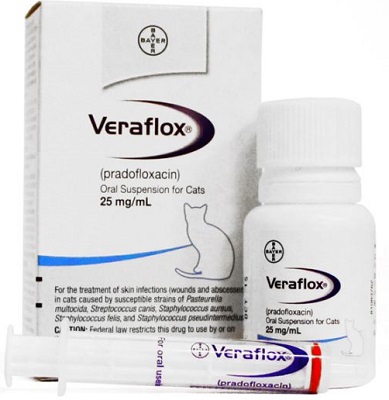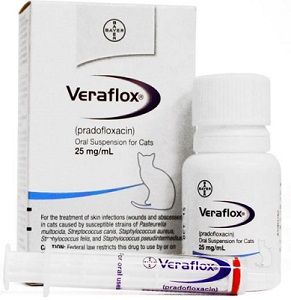Providing Quality & Trust || Clinic Website
Veraflox Suspension
Bayer Animal health
Starting at $63.40
$63.40 Each
Detailed Description
Veraflox Suspension

Indications:
Veraflox for cats is a cat skin infection antibiotic. Treats cat skin infections (wounds and abscesses) caused by susceptible strains of Pasteurella multocida, Streptococcus canis, Staphylococcus aureus, Staphylococcus felis, and Staphylococcus pseudintermedius. Contains pradofloxacin for cats.
Active Ingredients: Pradofloxacin 25mg/ml
BENEFITS:
- Easy-to-use dispenser makes accurate dosing simple
- Once-daily administration with a convenient, easy-to-deliver suspension
- For the treatment of acute infections of the upper respiratory tract caused by susceptible strains of Pasteurella multocida, Escherichia coli and the Staphylococcus intermedius group (including S. pseudintermedius).
- For the treatment of wound infections and abscesses in cats caused by susceptible strains of Pasteurella multocida and the Staphylococcus intermedius group (including S. pseudintermedius).
- for Cats
CONTRAINDICATIONS:
Do not use in cats with known hypersensitivity to fluoroquinolones.
Due to the lack of data, pradofloxacin should not be used in kittens aged less than 6 weeks. Pradofloxacin has no effects on the developing cartilage of kittens of 6 weeks of age and older. However the product should not be used in cats with persisting articular cartilage lesions, as these lesions may worsen during treatment with fluoroquinolones.
Do not use in cats with central nervous system (CNS) disorders, such as epilepsy, as fluoroquinolones could potentially cause seizures in predisposed animals.
Do not use in cats during pregnancy and lactation.
Whenever possible, the veterinary medicinal product should only be used based on susceptibility testing. Official and local antimicrobial policies should be taken into account when the veterinary medicinal product is used.
Fluoroquinolones should be reserved for the treatment of clinical conditions which have responded poorly, or are expected to respond poorly, to other classes of antimicrobials.
DO NOT USE IN DOGS. Pradofloxacin has been shown to cause bone marrow suppression in dogs. Dogs may be particularly sensitive to this effect, potentially resulting in severe thrombocytopenia and neutropenia. Quinolone-class drugs have been shown to cause arthropathy in immature animals of most species tested, the dog being particularly sensitive to this side effect. Pradofloxacin is contraindicated in cats with a known hypersensitivity to quinolones.
Not for human use. Keep out of reach of children. Individuals with a history of quinolone hypersensitivity should avoid this product. Avoid contact with eyes and skin. In case of ocular contact, immediately flush eyes with copious amounts of water. In case of dermal contact, wash skin with soap and water immediately for at least 20 seconds. Consult a physician if irritation persists following ocular or dermal exposure, or in case of accidental ingestion. In humans, there is a risk of photosensitization within a few hours after exposure to quinolones. If excessive accidental exposure occurs, avoid direct sunlight. Do not eat, drink or smoke while handling this product. It is recommended that used syringes be kept out of reach of children and disposed of properly.
ANIMAL WARNINGS:
For use in cats only. The administration of pradofloxacin for longer than 7 days induced reversible leukocyte, neutrophil, and lymphocyte decreases in healthy, 12-week-old kittens see Animal Safety section. If an unexplained drop in leukocyte, neutrophil, and/or lymphocyte counts is noted during pradofloxacin therapy, discontinuation of treatment is recommended.
DRUG INTERACTIONS:
Compounds e.g., sucralfate, antacids and multivitamins containing divalent and trivalent cations e.g., iron, aluminum, calcium, magnesium, and zinc may substantially interfere with the absorption of quinolones resulting in a decrease in product bioavailability. Therefore, the concomitant oral administration of quinolones with foods, supplements, or other preparations containing these compounds should be avoided. The dosage of theophylline should be reduced when used concurrently with quinolones. Cimetidine has been shown to interfere with the metabolism of quinolones and should be used with care when used concurrently. Concurrent use of quinolones with oral cyclosporine should be avoided. Concurrent administration of quinolones may increase the action of oral anticoagulants
POSSIBLE SIDE EFFECTS:
IThe most common side effects in dogs and cats are mild transient gastro-intestinal disturbances including vomiting, although these have only been observed rarely. Veraflox must not be used in animals that may be hypersensitive (allergic) to fluoroquinolone antibiotics. Veraflox must not be used in young growing dogs, in kittens below 6 weeks of age, in animals with joint problems caused by damage to the cartilage, or in animals with central nervous system disorders such as epilepsy. Veraflox must not be used in female animals that are pregnant or lactating.
Storage: The oral suspension should be stored below 30°C (86°F) in the original container and kept tightly closed. After opening, is stabile for at least 60 days.

Powered by nopCommerce
This site is running in live payment mode. Real payments will be processed.

